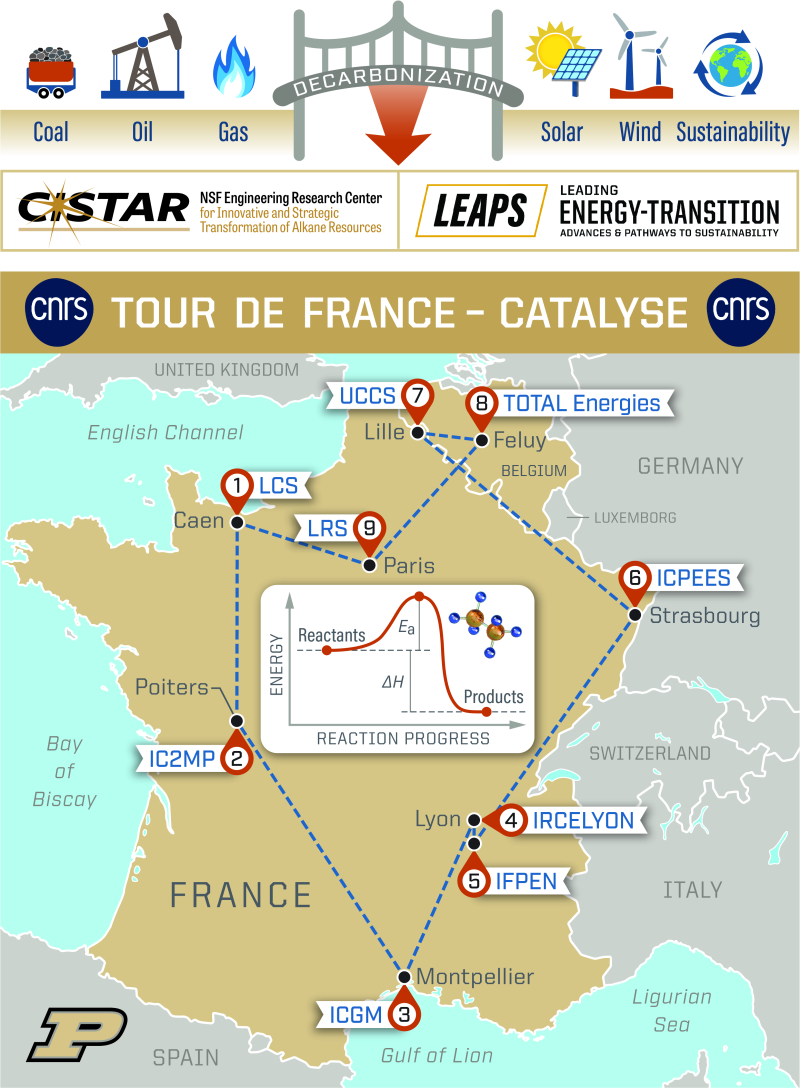CNRS Chemistry welcomes Fabio H. Ribeiro as an Ambassador in Chemical Sciences
On November 11th, 2024, Fabio H. Ribeiro, Distinguished Professor of Chemical Engineering at Purdue University, will begin a series of lectures at CNRS laboratories as the Ambassador in Chemical Sciences in France. His research focuses on heterogeneous catalysis with applications in bio-based chemicals, green processes, and carbon-neutral fuels. He will highlight the role of catalysis in creating efficient and sustainable energy systems.
What initially sparked your interest in heterogeneous catalysis, and how has it shaped your research career?
French professors who served as scientific ambassadors to my native Brazil clearly shaped my interest in catalysis. While at the Instituto Militar de Engenharia (IME), I had the privilege of studying within a collaborative framework between IME and the French government on catalysis. French professors played a key role in building research capabilities and fostering the study of catalysis in Brazil. This collaboration inspired me to pursue research in catalysis for my master's degree in Chemistry. My subsequent Ph.D. work at Stanford was also linked to this French influence. Professor Gérald Djéga-Mariadassou, a French professor stationed at IME, introduced me to Professor Michel Boudart who welcomed me in his lab. Their co-authored book, La cinétique des réactions en catalyse hétérogène, shaped my understanding of catalysis as a kinetic phenomenon, a central theme to my work.
Currently, my research activities focus on studying heterogeneous catalytic reaction kinetics and developing in situ and operando characterization techniques. I work within the Purdue Catalysis Center, fostering collaborations across research groups to tackle the energy transition. As Director of CISTAR, the Center for Innovative and Strategic Transformation of Alkane Resources, funded by the National Science Foundation, I oversee efforts to develop catalytic technologies for harnessing U.S. shale gas while reducing carbon footprints. I also co-direct LEAPS, a Purdue initiative aiming to develop scalable energy technologies through academic-industry collaborations.
How do you expect heterogeneous catalysis to enable breakthroughs in energy sustainability over the next 5 to 10 years?
Heterogeneous catalysis will be essential for the energy transition. While the long-term goal is to eliminate fossil fuels, the transition will be gradual due to the scale of global energy consumption, where fossil fuels still account for 80% of our energy mix. In the near term, catalysis will play a key role in reducing emissions, for example by replacing coal with lighter gases, which can cut CO₂ emissions by about 50%.
The focus should be on developing catalysts that enhance the efficiency and sustainability of current processes. We need new catalytic systems with improved performance and longevity to convert renewable feedstocks into fuels and chemicals. Additionally, catalysis will drive innovations in negative-emission processes, reactor designs using advanced techniques like plasmas, electrons, and photons and cost-effective carbon capture and sequestration methods. These advancements are crucial steps toward a sustainable, decarbonized energy future.
As a CNRS Ambassador of Chemical Sciences, what are you most looking forward to during your lecture tour in France?
I’m eager for the exchange of ideas and innovations this tour will enable. The energy transition is a global challenge, requiring diverse and collaborative solutions. Visiting leading academic and industrial laboratories across France will be a unique opportunity. I look forward to learning from French scientists, understanding their cutting-edge advancements and exploring how we can collaborate within the U.S. and globally.
This tour is personally meaningful, as my early training was deeply influenced by French professors. As a CNRS Ambassador, I’m honored to continue this tradition of scientific diplomacy, advancing liberty, equality, and fraternity through research. I’m excited to strengthen collaborations and create new ones that will advance the science of catalysis and its role in the energy transition.
Editor: AVR
Lectures tour
- 15/11/2024 - Caen - Laboratoire de catalyse et spectrochimie (Guillaume Clet)
- 18/11/2024 - Poitiers - Institut de chimie des matériaux et milieux de Poitiers (Florence Epron)
- 20/11/2024 - Montpellier - Institut Charles Gerhardt Montpellier (Eric Clot et Aurélie Arnaud)
- 21/11/2024 - Lyon - Institut de recherches sur la catalyse et l'environnement de Lyon (Christophe Geantet)
- 22/11/2024 - Lyon - IFPEN (Pascal Raybaud)
- 25/11/2024 - Strasbourg - Institut de chimie et procédés pour l'énergie, l'environnement et la santé (Cuong Pham-Huu)
- 26/11/2024 - Lille - Unité de catalyse et de chimie du solide (Jean-François Lamonier)
- 27/11/2024 - Feluy (Belgique) - Total Energie
- 29/11/2024 - Paris - Laboratoire de réactivité de surface (Cyril Thomas)

